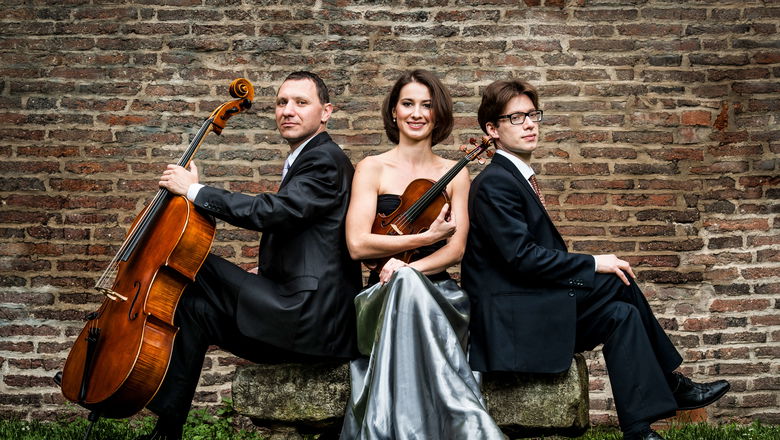Programme
Ludwig van Beethoven
Piano Trio No. 2 in G major, Op. 1 (34')
— Intermission —
Antonín Dvořák
Piano Trio No. 3 in F minor, Op. 65 (42')
Secure your seat for the 2025/2026 season – presales are open.
Choose SubscriptionSoon after its founding in 2008, the wonderful Orbis Trio established itself as one of the most acclaimed Czech chamber ensembles. For their concert in this series, violinist Petra Brabcová, cellist Petr Malíšek, and pianist Stanislav Gallin have chosen an early work by Ludwig van Beethoven and a mature work by his great admirer Antonín Dvořák.
Subscription series HP | Duration of the programme 1 hour 35 minutes | Czech Chamber Music Society
Ludwig van Beethoven
Piano Trio No. 2 in G major, Op. 1 (34')
— Intermission —
Antonín Dvořák
Piano Trio No. 3 in F minor, Op. 65 (42')
Orbis Trio
Petra Brabcová violin
Petr Malíšek cello
Stanislav Gallin piano

Orbis trio
Ludwig van Beethoven
Klavírní trio G dur op. 1 č. 2
Antonín Dvořák
Piano Trio No. 3 in F minor, Op. 65
The legacy of Antonín Dvořák (1841–1904) reveals his extraordinary relationship to chamber music – this is evidenced not only by his fourteen string quartets, but also by four piano trios, three quintets and other compositions. And on top of that it is not known what Dvořák had destroyed – at least, we know of the two early piano trios mentioned in the introduction to this text. Piano Trio No. 3 in F minor, Op. 65 is one of the major achievements of Dvořák’s chamber music. It stands out by the wealth of musical ideas and their resourceful development, the masterly structure of the individual movements and the almost symphonic quality of the work as a whole, while maintaining the right balance between the instruments. This trio is often seen as the chamber counterpart to Dvořák’s Symphony No. 7 in D minor, written two years later. In terms of its expression and mood, the trio differs from what was common in Dvořák’s early Slavic period. Its music is grave, brooding, contemplative and defiant; at the same time it is often described as Dvořák’s “most Brahmsian” work. Dvořák was well on his way to an international career at this time (invitation from the Philharmonic Society of London, among others), and it seems that he decided to write a composition that would draw on the best European musical traditions and compete on equal footing with the works of Beethoven or Brahms, just as he had successfully attempted with his Seventh Symphony. However, Dvořák manifested his Slavic heritage here by quoting one of his own Songs on the Words of the Dvůr Králové Manuscript from 1872 (namely The Cuckoo from the first movement). The immediate impetus for the composition of the Piano Trio is said to be the death of Dvořák’s mother, Anna Dvořáková. The composer started work on the score about a month later, writing from January to March 1883. He did a great deal of reworking and editing. The premiere of the Piano Trio was given on 27 October 1883 in Mladá Boleslav by the violinist Ferdinand Lachner and the cellist Alois Neruda; Dvořák himself as an excellent pianist (not only a violist and violinist!) sat at the keyboard. The Piano Trio was soon performed in Prague by the same ensemble and published that same year by the Berlin-based publisher Simrock. The internet website dedicated to Antonín Dvořák features a period press review from 13 February 1884 by the critic Eduard Hanslick in Neue Freie Presse: “The most valuable gem brought to us amid the plethora of concerts in recent weeks is undeniably Dvořák’s new Piano Trio in F minor. It demonstrates that the composer finds himself at the pinnacle of his career. If we disregard the smaller genres, it is particularly the Symphony in D major, the string sextet, and now the Trio in F minor which rank Dvořák among the world’s greatest modern masters.”
Soon after its founding in 2008, the wonderful Orbis Trio established itself as one of the most acclaimed Czech chamber ensembles. For their concert in this series, violinist Petra Brabcová, cellist Petr Malíšek, and pianist Stanislav Gallin have chosen an early work by Ludwig van Beethoven and a mature work by his great admirer Antonín Dvořák.